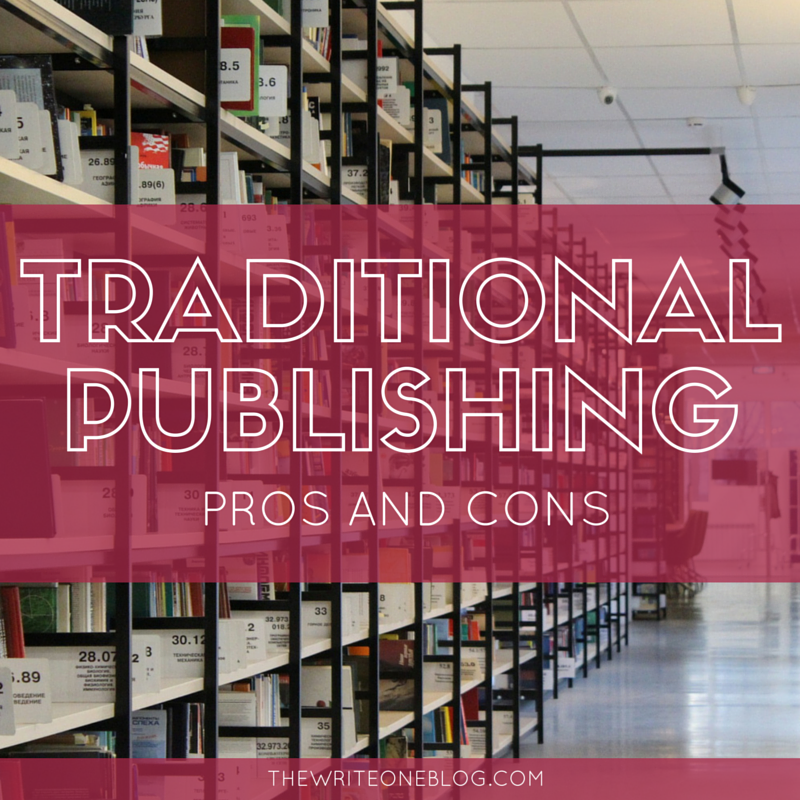You are probably going back and forth about whether you should publish your book traditionally or try to self publish. Maybe you are considering going with self publishing to spare yourself from rejection or overly critical opinions of your book. While being traditionally published won’t save you from rejection and critiques, it may be the better option for you based on your goals, time restraints, and resources. Consider these traditional publishing pros and cons, before making a decision.
Traditional Publishing Pros and Cons – The Pros:
1. Risk – The publishing company assumes the biggest risk. They are responsible for the book’s layout, typesetting, editing, graphic design, and distribution just to name a few of the areas they assume the risk of.
2. Edits – Publishing houses will make sure the book has been professionally edited to make certain that the best possible product is placed on the shelves.
3. Business – They handle the assigning of ISBN numbers, accounting (royalties), and copyrights. They ultimately alleviate logistical nightmares. Also, they have staff that is equipped in giving you advice and support.
4. Exposure – Traditionally published authors have greater access to traditional forms of publicity like television and radio interviews, magazine write-ups, etc. Also, books by traditionally published authors are more likely to be sold in bookstores because of the credibility of the publisher and the ability of the bookstore to return books if they don’t sell. Having your book in bookstores is great for exposure and gives the writer the option of doing in-store book signings.
5. Book Tours – The publishing company will help you to set up book tours in different cities and also virtual online book tours. Finding leads on businesses that will host book signings and give you the exposure you need to succeed can be difficult and another major undertaking. Having people that are already connected in the publishing industry is helpful and definitely a time-saver.
6. Reputation – If you sign to a traditional publisher they will usually have a name that is respected in the public eye. Some readers will buy your book based off the reputation of the company and the track record of previous books they’ve published.
7. Experience – The publishing company’s experience in publishing gives them the ability to make sure your book is able to compete with books currently in the market. From the salability of the book itself to the book cover and even the edits, you want to make sure your book looks as professional as any other book on shelves.
One thing to remember in choosing to publish through a traditional publishing company is that they will be dedicated to helping your book have the best chance of being successful. They have a lot of vested interest in your project and will root for your success all the way. When weighing traditional publishing pros and cons, remember that traditional publishing is usually for the writer who doesn’t want to figure out the ins and outs of the publishing industry. By having a publishing company to back your effort, you gain the help of a team that puts you in a better position to succeed.
NEXT: The Traditional Publishing Path – How To Get Signed To A Publishing Company
Traditional Publishing Pros and Cons – The Cons:
1. Requirements – You will need to have a literary agent to get signed to a publishing company and finding an agent can be as big an undertaking as getting signed to a publishing company.
2. Advances – The cash advance you receive will have to be paid back, generally through book sales. It may be a while before you see any profit from the sale of your book since the first monies will be going to your publishing company to recoup their upfront expenses.
3. Marketing – While a traditional publisher will certainly help with book marketing, it will also be up to the author to do their own marketing. From reaching out to your social media fan base to soliciting blogs and websites related to your book’s subject matter, the author will also have to roll up their sleeves and do a considerable amount of work.
4. Deadlines – Being signed to a traditional publishing company means that you will be bound by contractual deadlines and obligated to the publishing company for a certain number of books.
5. Reputation – Generally speaking, whatever your first book does in sales will establish a reputation for you amongst publishers. If the first publication you put out does not fare well, it may keep you from landing another deal.
6. Final word – The publishing company has the final say on the book cover, title, edits, plot, characters etc. While you are the writer, it is possible that you will lose some creative control.
Traditional Publishing Pros and Cons – What Now:
It takes careful consideration when weighing traditional publishing pros and cons. Prepare yourself ahead of time for the work it will take to publish and sell the book you spent so much time writing. With the right mindset, you will be able to accomplish your goals.
If after weighing the traditional publishing pros and cons, you are leaning more towards a different publishing option remember that you the writer will do much of the footwork. Which also means that it will sometimes take you away from what you want to do most and that is write.
If after considering traditional publishing pros and cons, you’ve decided that you’re more suited for self publishing, please read the next post in this series.
NEXT POST: Self Publishing vs Traditional Publishing
Now that you know the traditional publishing pros and cons, what do you think you will do? Will you traditionally publish or self publish? Please share in the comment section below.



0 Comments